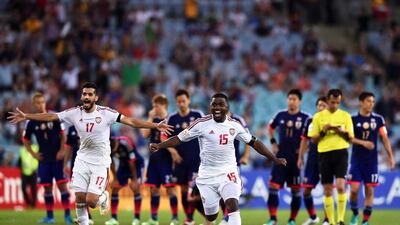When Majed Hassan, Habib Fardan and Ismail Ahmed arrived at Stadium Australia on Friday, it is unlikely any of them imagined they would, a few hours later, be standing over a penalty kick with the fate of the national team on their shoulders.
None were in Mahdi Ali’s first XI for the Asian Cup quarter-final match with defending champions Japan.
Hassan had not played in Australia, and Fardan had two late appearances and one game in group play, in which he was unimpressive. Ahmed had 10 minutes against Qatar 12 days before.
But then a series of “ifs” conspired to make them the men on the spot:
If Ali Mabkhout had not scored a marvellous goal in the seventh minute.
If the Emiratis had not bunkered in to defend that lead into the second half.
If Mahdi Ali had not brought on the trio – Hassan in the 54th minute, Fardan in the 58th, Ahmed in the 76th – with the intent of stiffening the defence at the cost of limiting his attacking options.
If Gaku Shibasaki had not levelled for Japan on 81st minutes.
If both teams, exhausted in the 30 minutes of extra time, had not jogged to a 120-minute stalemate.
If any of that had worked out differently, those three would not have marched up to take their chance in the shootout that determined which team would advance to the Asian Cup semi-finals on Tuesday against hosts Australia.
Japan, shooting first, led 3-2 when Hassan, at 22 the youngest player in the side, was sent forward to follow Khamis Ismail, who skied his shot over the bar.
The hard-tackling midfielder looked nervous, but it seems looks were deceiving as his shot went into the top right corner.
Japan converted to make it 4-3 and, as Fardan strode forward, he knew a miss would end the match, with Japan advancing.
He seemed dispassionate – confident? detached? – but whatever he was feeling, his shot beat Eiji Kawashima lower left.
Then, like Japan’s other major international star, Keisuke Honda (AC Milan), Shinji Kagawa (Borussia Dortmund) missed his penalty, hitting the left post.
That brought up Ahmed, at 31 the oldest player in the side, who was making only his third appearance with the senior national team.
Like the two substitutes before him, he had never been in such a high-pressure situation while with the UAE. Like the other two, he banged his shot into the goal.
UAE 5-4 on penalties and into the semi-finals.
The clutch performances of the trio lent credence to Mahdi Ali's oft-repeated insistence that he leads a 23-man team, not 23 individuals in some sort of hierarchy. Seventeen of those 23 have played in Australia.
The collaboration of this group led to the most important result for the national team since they reached the Asian Cup final in 1996, as hosts.
Asian football has improved dramatically since then, and this pressurised victory over serial continental champions Japan – a result that will be noted by football fans worldwide – must be considered the No 1 moment in UAE football history.
At least until Tuesday’s semi-final, when other heroes may emerge.
poberjuerge@thenational.ae
Follow us on Twitter at @SprtNationalUAE

